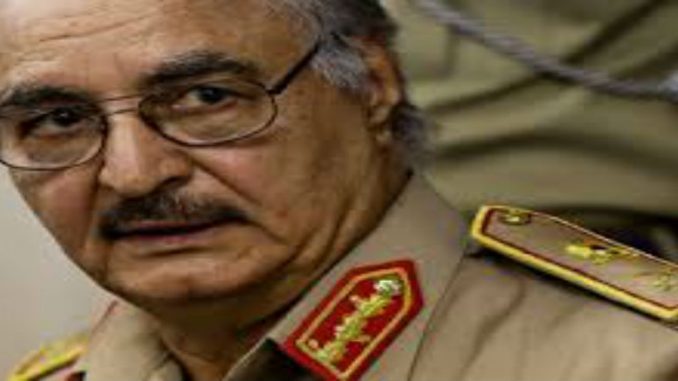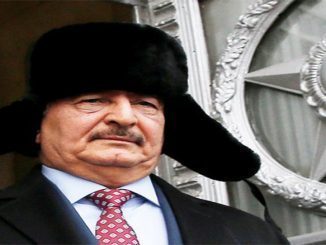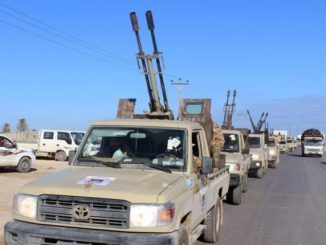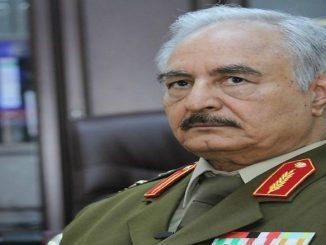
The latest European Union meeting discussed the possible role of the commander of the army of the House of Representatives (HoR), Khalifa Haftar, in the United Nations-backed government, amid fears of him exerting control over the government, said Boris Johnson, the British Foreign Secretary.
In the same context, Libya Prospect, a Libyan News Website, cited a source inside the Egyptian Foreign Ministry saying that FM Sameh Shoukry has asked in a meeting with his Emirati counterpart, Abdallah Bin Zayed, Emirati leaders to “pressure Haftar to avoid any moves that could escalate new conflicts.”
According to the Egyptian sources, “Haftar opposed the Egyptian efforts to organize a meeting with the head of the Presidential Council (PC) of the Government of National Accord (GNA), Fayez Al-Serraj in Cairo. The proposal was made by Russia, holding to a military approach”.
But Johnson said, as reported in The Times, that the Europeans “discussed the need to unify the eastern and western Libya as the Libyan Political Agreement says.”
Moreover, Federica Mogherini, the High Representative for Security and Foreign Policy in the European Union, said that “the European Union is willing to facilitate a meeting between Al-Serraj and Haftar, while continue supporting the PC.”
In the same context, high-profile Egyptian sources reported last month that Cairo was preparing to host a meeting between General Khalifa, and the Chairman of the Libyan presidential council in the UN-backed Government of National Accord (GNA) Fayez Al-Serraj, as reported by Libya express.
The sources added, “the meeting will try to build bridges between the two parties and will aim at finding a solution for the Libyan political crisis.”
Accordingly, these statements by both the European and Egyptian sources raised questions about the timing, and whether Haftar will accept to be assigned the defense minister in the awaited government, besides other issues regarding reservations by local and regional parties.
It is worth to mention that Al-Sisi’s military and political officials have been working throughout the previous months with different Libyan factions to strengthen Haftar’s role in Libya especially by focusing on amending the Political Agreement (PA) article that outlined the authorities of the Libyan army chief commander and that also excluded Haftar from leading the army.
In this context, excessive meetings have been held, under Egypt’s auspices, with several Libyan officials and members in Tobruk’s House of Representatives to resolve the Libyan crisis and amend the Skhirat agreement in a way that enclose Libya’s strongman in the political process.
On December 13, 2016, Cairo hosted a conference attended by Libyan officials and representatives from the country’s numerous factions, where they issued a declaration of principles and five proposed amendments to an agreement, brokered by the UN in 2015.
The Libyan Political Agreement, signed in Skhirat, Morocco December 2015 known as the Skhirat Agreement, intensified the internal strife rather than resolving it.
The conference concluded an agreement on amending the 8th article of the 2015 agreement that outline the authorities of the Libyan army chief commander.
The article constituted a major obstacle during signing Skhirat agreement as it included the exclusion of General Khalifa Haftar from leading the army.
The conference meetings were brokered under the auspices of the Egypt’s General Intelligence Directorate and in a hotel related to the security entity.
The conference concluded what the participants consider as “a road map to achieve unity in Libya during the coming period, “and one of the major recommendations presented by the participants, “to reconsider the responsibilities of the army chief commander that is currently held by Aqila Saleh, the head of Tobruk’s House of Representatives (HoR), who has promoted General Khalifa Haftar to Field Marshal last September.
Haftar is a military figure, backed by Tobruk government based in eastern Libya that refuses to recognize the U.N.-backed government, enjoys the support of several Arab nations, including Egypt, the United Arab Emirates, and Jordan, as well as western countries as France.
Adel Abdel Kafi, the Tripoli-based military expert, said that “Haftar supporters are now aware that he is not capable of achieving decisive military victory. Thus, they all attempt political settlement, some already drew back support, including Egypt that convened recently with parties who oppose Haftar project.”
“Regarding the pressures to restrain Haftar, are all political maneuvers to push all parties towards a peaceful solution away from military confrontations, “he said.
He confirmed that “if Haftar was cut off military and political support, he will stop and may totally disappear.”
On the other hand, Al-Said Abu Al-Khair, the Egyptian international laws professor, said that “Haftar resembles Abd al-Fattah Al-Sisi, each was assigned a role by the West to perform, the coup succeeds in Egypt, unlike Libya. Thus, the goal and motive are the same.”
He continued,” The European and Egyptian statements are only western orders, assignments to be implemented in time, but it is unlikely that Cairo would draw back support to Haftar”.
The Libyan writer, Abdallah Al-Kabeer, said that “nearly all regional and international players seek the political resolution to the Libyan crisis, with a role to Haftar, especially that he can’t militarily win the war.”
Regarding the Egyptian role, he said that “Egypt’s role witnessed a significant shift towards pushing Haftar to accept the political settlement, but at the same time, Cairo is seeking to guarantee him broad authorities in the Libyan political and military scene.”
Since the Libyan Revolution that overthrew the long-time dictator 2011 Muammar Gaddafi, violence has spread in Libya among the different Libyan factions.
Two rival governments operate in Libya, with self-proclaimed authorities controlling the capital of Tripoli and adjacent western areas and an internationally recognized government, based in the eastern Libyan city of Tobruk.
Moreover, a third government was formed known as the Government of National Accord(GNA) supported by many western countries. The government has so far failed to restore the country’s unity.
None of the governments has a complete dominance over Libya until now.



